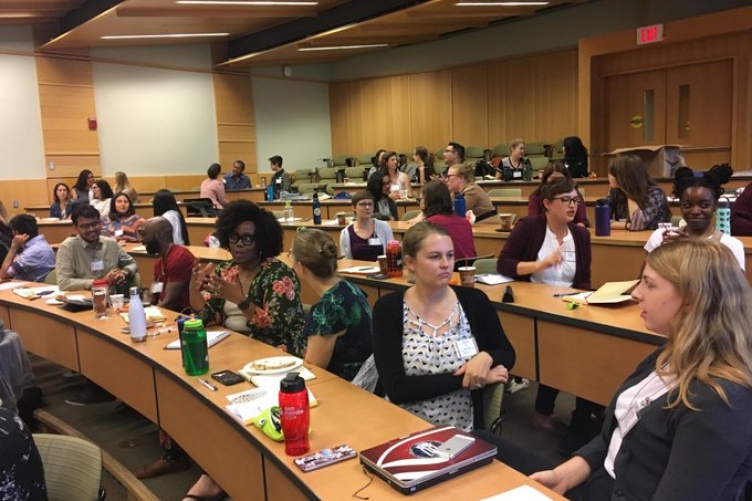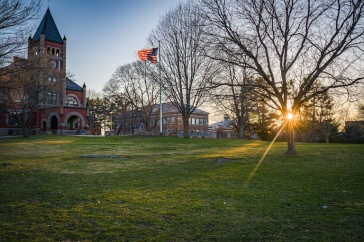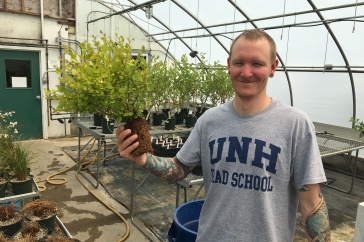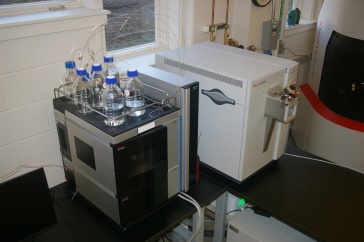
Participants in discussion at the 2019 Reclaiming STEM East
“The day was one of excitement, vulnerability, and empowerment with over 70 participants and speakers,” said Tamara Marcus, Ph.D. student in UNH’s Natural Resources and Earth Systems Science program and organizer of the 2019 East Coast Reclaiming STEM meeting.
Reclaiming STEM is a science communication (SciComm) workshop created by two graduate students at the University of California-Irvine, Evelyn Valdez-Ward and Linh Anh Cat, and was born from the need to provide students from marginalized groups the skills they need to connect and share science with diverse communities.
Marcus got to know Valdez-Ward at various science communication conferences, and the two Ph.D. students stayed connected through Twitter.
“We both shared our frustration on the lack of attention given to conversations about the importance of inclusivity and equitability in discussions of science communication,” Marcus said. “Often, discussions on diversity, equity and inclusion are seen as ‘bonus’ talks or ideas and are rarely integrated into the dominant dialogue. It is important that we as scientists think about how we share our data, who can access it, and who is most impacted by our results and what they lose if they can’t access it.”
Unlike other meetings and conferences, Reclaiming STEM places diversity and inclusion at its center. It seeks to widen the circle of inclusion in science communication by prioritizing under-represented groups such as minorities, womxn, LGBTQ+ people, and people with disabilities.
It wasn’t long before Marcus started investigating the possibility of bringing Reclaiming STEM to the East Coast. When she pitched the idea to UNH Graduate School Deans Cari Moorhead and Dovev Levine, she was met with immediate support, including financial support from the graduate school, the American Geophysical Union and others.
“Speakers were found from our shared networks as well as from help from the robust scientific Twitter community,” Marcus said. “We intentionally looked for speakers who would represent and share the background of the students we hoped to recruit—scientists of color, indigenous scientists, queer and LBGTQIA+ identifying scientists, and scientists with disabilities.”
Thus, on Sept. 21, 2019, students, faculty and staff from a variety of disciplines, backgrounds and institutions gathered on the University of New Hampshire campus for the first Reclaiming STEM East Coast meeting.
Among the various speakers was Adriana L. Romero-Olivares, Postdoctoral Diversity and Innovation Scholar at UNH. Romero-Olivares gave a keynote on her experience as a woman of color in STEM, encouraging attendees to explore avenues for activism through science with the ultimate goal of decolonizing systems of oppression.
“Altogether, I spoke about how all of this (privileges, life experiences, challenges) provides us with a very unique perspective and voice that we can use to do activism for social justice to achieve a greater good,” Romero-Olivares said. “I felt that [Reclaiming STEM] was a very positive experience for a lot of people with little to no experience in activism, in and outside of STEM.”
Participants were active online throughout the day using the hashtag “RSEast19."
Saturday morning && we're a full house at #RSEast19 @UNHWildcats in Durham! Excited to be hosting so many students at the first-ever East Coast @Reclaiming_STEM workshop! Thanks to @wardofplants, @LinhAnhCat, and @carimoorhead for their organizing! pic.twitter.com/5D3kzk14vM
— ReclaimingSTEM (@Reclaiming_STEM) September 21, 2019
Though Marcus identified many challenges for underrepresented students at a predominantly white institution, she also expressed gratitude for the UNH community and its willingness to make space for the kinds of conversations happening at Reclaiming STEM.
“Having this event at UNH showed the university’s commitment to improving spaces of learning for students from marginalized groups and demonstrated the institution as a beacon of change that other universities in the nation could follow,” Marcus said. “Many of the out-of-state attendees shared that their institutions would never hold an event like this. For them, UNH seemed revolutionary and inspiring, potentially giving them hope of what their home institutions could become.”
Indeed, Maggie Hernandez, a third-year Ph.D. student in the department of anthropology at Penn State University found out about the Reclaiming STEM meeting through Twitter. Of the many takeaways she remarked upon, she was most intrigued by the strong emphasis on science communication she found at UNH. “The focus UNH has on creating scientific leaders and spreading knowledge was evident throughout the course of the workshop, and I am grateful to have received valuable training that I can bring to my own research and institution,” Hernandez said.
Tamara Marcus is a recipient of the 2019 Switzer Fellowship and is currently based in Australia working on a project to understand how people from the indigenous Yolngu Nation in the Northern Territory currently access climate data, as part of her overall climate change communication research. Learn more about her research here.
-
Written By:
Lily Greenberg '21G | Grad School
















































